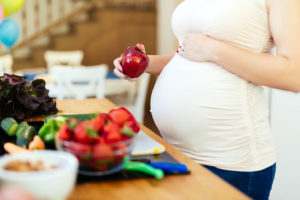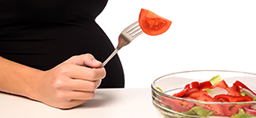
If you’re a woman who’s trying to get pregnant, it might be a good idea to eat more fruit and cut back on fast food.
That’s the advice of researchers who conducted a study following nearly 5,600 women in Australia, New Zealand, the United Kingdom and Ireland who had never had a baby and wanted to conceive.
Those who ate fruit less than one to three times a month took a month longer to get pregnant than those who ate fruit three or more times a day.
On the flip side, those who ate fast food four or more times a week took nearly a month longer to get pregnant than those who never or rarely ate fast food, the study found.
Our Take
Thinking about having a baby? These lifestyle changes can help.
Improving your diet starts with the basic things we probably all know, notes Samantha Kauffman, RNC, a perinatal education coordinator at Spectrum Health Gerber Memorial.
Eat lots of fresh fruits and vegetables.
Current literature has more specifics about what to eat and not eat. This would include eating healthy fats, supplementing with vitamin C, eat folate (folic acid), and include zinc, which has been linked to fertility.
Foods with folate include dark leafy greens, citrus fruits, broccoli, lentils and asparagus. Foods with zinc include oysters, wheat germ, spinach, beans, mushrooms and nuts. Keep in mind that vitamin C and zinc help keep the sperm from clumping.
Eight percent of the couples in the study were classified as infertile, defined as taking longer than a year to conceive, while 39 percent conceived within a month.
The risk of infertility among women with the lowest intake of fruit increased from 8 percent to 12 percent, and it increased from 8 percent to 16 percent among those who ate fast food four or more times a week, the researchers found.
But the study did not prove a cause-and-effect relationship between food and fertility; it only showed an association.
The study was published in the journal Human Reproduction.
“These findings show that eating a good-quality diet that includes fruit and minimizing fast food consumption improves fertility and reduces the time it takes to get pregnant,” said study leader Claire Roberts, from the University of Adelaide in Australia.
“We recommend that women who want to become pregnant should align their dietary intakes towards national dietary recommendations for pregnancy,” she added in a journal news release.
Study first author Jessica Grieger, also from the University of Adelaide, said, “Our data show that frequent consumption of fast foods delays time to pregnancy.”
 /a>
/a>
 /a>
/a>
 /a>
/a>